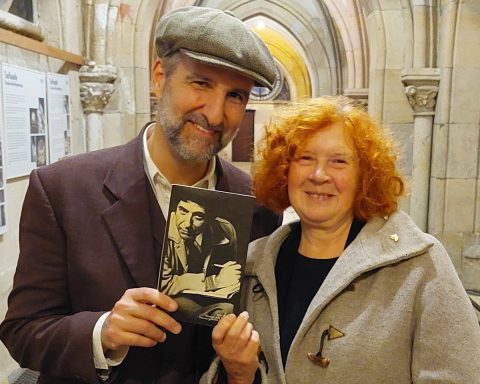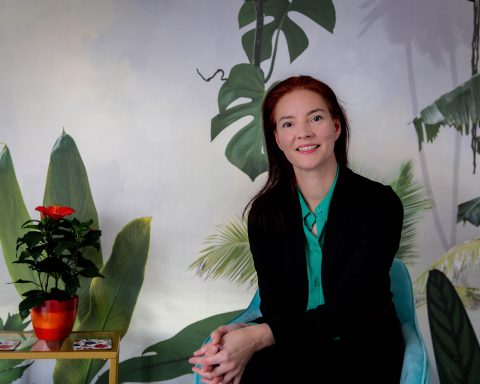Editor’s note: Brazilian writer Felipe Cherubin, who has worked as a journalist for Estado de S. Paulo and studied (and extensively read and dissected even on his free time) philosophy and psychology, managed to land this fascinating interview in English with Jonathan Haidt. A social psychologist, Haidt, in his own words, studies “morality and emotion, and how they vary across cultures.” To give you an idea of Haidt’s influence, here’s how Wikipedia describes him: “Haidt is the author of two books: The Happiness Hypothesis: Finding Modern Truth in Ancient Wisdom (2006) and The Righteous Mind: Why Good People are Divided by Politics and Religion (2012), which became a New York Times bestseller. He was named one of the ‘top global thinkers’ by Foreign Policy Magazine, and one of the ‘top world thinkers’ by Prospect magazine. His three TED talks have been viewed more than 3 million times.” (Haidt on TED talks: https://www.ted.com/speakers/jonathan_haidt).
Felipe, my friend for 20 years, was kind enough to give me as a present for the blog this exclusive interview he conducted with Haidt via e-mail in 2013. The interview featured below – a sort of philosophy of psychology and psychology of philosophy – touches on a range of issues including nature vs. nurture, the marginalization of Darwin, the moral cult of religious leaders and philosophers, and eating one’s own pet dog. I hope you will enjoy it as much as I did!

Interview with Jonathan Haidt, by Felipe Cherubin
19 November 2013
Q: Your “Social Intuitionist Model of Moral Judgment,” based on automatic processes [moral intuitions ] rather than on conscious reasoning is a position that contradicts not only the rationalist tradition [ Descartes , Kant and so on] but also recent models such as Piaget and Lawrence Kohlberg. Why the differences between those models and your proposal about social intuitionism?
A: There is a long cultural tradition in the west of worshipping reasoning. It goes back to Plato, and is the dominant view of philosophers, especially ethicists. But one of the most consistent discoveries of the last 50 years is that human reasoning is not very good at dispassionate analysis. It makes a very good lawyer, but not a good impartial judge. This is basically what the philosopher David Hume said in the 18th century: “Reason is and ought only to be the slave of the passions, and can pretend to no other office than to serve and obey them.” In my own research, I have found that Hume was right. When people make moral judgments about harmless but disgusting events – such as a family that eats its pet dog, after the dog was killed by a car — they go with their gut feelings and then make up all kinds of crazy post-hoc justifications. For example, my research subjects in the USA and in Brazil would sometimes say “well, it’s wrong because if they eat the dog, they’ll get sick.” But when I’d point out that the dog meat was cooked, so all the germs were killed, nobody changed their minds. Rather, they just look harder for other justifications of their gut feelings.
Q: Carol Gilligan was also a critic of Kohlberg’s model. Do you agree with her review of Kohlberg’s model?
A: The research that came after Gilligan’s critique generally did not find that men and women are much different in their moral judgments. But as Gilligan pointed out later, men and women certainly do differ in their moral behavior! Nearly all violent criminals are men. I think Gilligan was correct that Kohlberg was too focused on moral reasoning, and had ignored the importance of moral emotions, such as compassion, which was part of her “ethic of care.” I agree with her that Kohlberg’s theory focused too much on justice—which I believe is just one of the six major foundations of morality.
Q: What you called the emotion “moral elevation” has come back into public discussions, as well as the concept that “transcendentals are the properties of being” [Beauty, Goodness, Truth] and the idea of the “Great Chain of Being.” Researchers such as Arthur Lovejoy [The Great Chain of Being : A Study Of the History of an idea], Ken Wilber [Integral Theory], Viktor Frankl [Self- Transcendence], Howard Gardner [Truth, Beauty, and Goodness Reframed], and Jean-Pierre Changeux [The Good, the True, and the Beautiful: A Neuronal Approach] also are making an effort to revive these ideas. So, what can you learn from these old ideas today?
A: Human beings have a range of profound emotional experiences. Scientists study a range of emotions too. The two ranges sometimes fail to overlap, as happened with the “self-transcendent” emotions of moral elevation and awe. Humanists such as Frankl and Wilber have written about these delicate and uniquely human emotions. But psychologists focused their efforts on the emotions we share with animals, and can study in rats – for example, fear, anger, and joy. In 1998, when I began to study moral elevation – the emotional response to witnessing moral beauty – I was not able to find any experimental research at all. Now there is a great deal, which I have collected together at www.ElevationResearch.org. I believe that these emotions reveal a dimension of human experience that we can call “divinity.” I don’t mean to say that god exists. But I do mean to say that people naturally and spontaneously feel that some people, some places, and some actions are more godlike, uplifting, pure, or closer to god, whereas others are more base, degraded, disgusting, or demonic. Research psychologists avoided such quasi-religious phenomena for a long time. But the great William James wrote a whole book on them (“The Varieties of Religious Experience”), and in the last 10 years, there has been a resurgence of research on the psychology of religion. Some people, such as the neuroscientist Andrew Newberg, have even put experienced meditators into brain scanners and watched their neural activity as they reached states of self-transcendence. It turns out that we do literally “lose ourselves” – the parts of the brain in the parietal lobe that maintain our mental maps become less active, according to Newberg. The boundaries between ourselves and others blur.
Q: Socrates/Plato/Aristotle, Buddha and Jesus are considered moral examples. How do you understand their legacies nowadays? Or, in other words how does one come to see “Modern Truth in Ancient Wisdom” as not ideas but life examples?
A: Moral exemplars have the greatest effect on us when they are embedded into stories. Socrates comes down to us embedded in stories about his willingness to die rather than to retreat from speaking the truth. He is still a hero in academic and scientific circles. Plato and Aristotle come down to us only in their writings. They were brilliant, but were not moral exemplars. Buddha and Jesus come down to us both in stories about their super-human virtues and as the authors of sermons and aphorisms. In both cases, for example, we learn about a man who was able to love in an unconditional and unattached way, and who could overcome normal human anger and pettiness. This is why there are still many millions who read their words today – far more than the number who read Plato and Aristotle. Their lives are still quite relevant to us today as we struggle with relationships, greed, and a sense that there is a higher, nobler, better way to live.
Q: You chose a great title for your book “Flourishing: Positive psychology and the Life Well” because “Flourishing” is the best term to define Aristotle’s concept of happiness [eudaimonia]. Do you believe that people misunderstand the real meaning of happiness?
A: In the United States, many people have a shallow notion of happiness, thinking that it is a feeling. But the ancient Greeks saw “happiness” as being more about the conditions of one’s life, including its moral valences. Did you live a life that you can be proud of? You can’t know if a man was truly happy until after he is dead, they said. I wouldn’t go quite that far. My own view, which I came to when writing The Happiness Hypothesis, is that true happiness comes from between. It emerges in the lives of people who have gotten the right relationship between themselves and other people, themselves and their work, and themselves and something larger than themselves.
Q: In a world where the globalization phenomenon is increasing, people start to question their own values. Do you believe that there are innate characteristics that integrate all of us independent of social, historical or cultural background?
A: A useful analogy here is to the human sense of taste. We all have the same 5 taste receptors on our tongues – for sweet, sour, salt, bitter, and MSG (or Umami). These evolved to help guide our ancestors to the foods that were good for them, especially fruit and meat. So we all have the same tongues, yet each culture has developed its own cuisine. We humans are not united in our food preferences (except maybe in our love of ice cream.) It’s the same for morality. In my research I have found that there are at least six universal “taste buds” of the moral sense. These are: care/harm, fairness/cheating, liberty/oppression, authority/ subversion, loyalty/betrayal, and sanctity/degradation. When we see a person kicking a cat, or betraying a friend, or cursing a parent, we feel a strong flash of condemnation. We know instantly that this is a bad thing, just as if someone put a drop of bitter quinine on our tongues. Yet if you look at the full, rich, moral systems developed around the world, they can be quite different. The biggest surprise in my dissertation research was that the differences across social class, within Brazil or within the United States, were actually larger than the average difference between Brazilians and Americans. People in higher social classes have a narrower moral domain – they mostly say things are wrong when they hurt people. Rich people care less about group loyalty, and about sanctity and religious issues.
“Morality, by its very nature, makes it hard to study morality. It binds people together into teams that seek victory, not truth. It closes hearts and minds to opponents even as it makes cooperation and decency possible within groups.” – Jonathan Haidt
Q: Peter Kropotkin wrote a book about the phenomenon of cooperation “Mutual Aid: A Factor of Evolution,” written partly in response to Social Darwinism and in particular to Thomas H. Huxley’s 19th century essay “The Struggle for Existence”. Is it correct to say that in the public debate nowadays we are seeing a lot of misunderstandings about Darwinian laws and legacy and repeating the Kropotkin- Huxley debate without understanding the real problems and true concepts?
A: I love Darwin; I have found that evolutionary thinking is the key to understanding the world around us, especially human nature. Unfortunately, Darwin is attacked from two sides. On the religious right, there are those who deny that humans evolved, and who don’t want their children to be taught about evolution. On the secular left, there are those who are so obsessed with fighting racism and gender discrimination that they reject evolution, because some people (not Darwin) used evolution to argue that there were innate differences between races, and between men and women. It’s a shame that many of these people are professors in the social sciences, such as anthropology and sociology. These are the people who confuse Darwinism (the theory of evolution) and social Darwinism (the belief that it is good to let poor people, races, and nations die off, to improve the gene pool). These leftists are so afraid of social Darwinism that they refuse to believe that evolution shaped the human mind. (They grant that it shaped the human body.) They therefore can’t really do social science, since they are committed to a false scientific idea that children are born as “blank slates” which society then writes upon. But in fact, developmental psychologists have been finding for 30 years now that babies know a lot – they were born knowing it. We have a great deal of innate, evolved knowledge.
Q: Who are in your opinion the great thinkers that pointed out incredible achievements to understand better the human condition?
A: Some philosophers and humanists had deep insights into psychology that have been born out by modern research. In my book The Happiness Hypothesis I examined such cases. Some of the wisest psychological thinkers were Buddha and Marcus Aurelius, for their insights into how to keep calm in troubled times; David Hume and Thomas Jefferson, for their insights into the role of emotions in moral judgment; and Shakespeare, for his insights into… just about everything, including love, loss, parenting, jealousy, and power.
Q: Finally , I have a question about your latest book, “Why Good People are Divided by Politics and Religion.” As a Brazilian, in my society I see people suffering with corruption, laws that do not work, bribes, outlaws, cheaters, political alienation and a mix of religions that causes a certain tolerance via a kind of ignorance. The question of the social psychologist P. Zimbardo, seen to be more realistic in the Brazilian context, is “Why good people turn evil?” In the USA the feeling of trust is higher than in Brazil where people try to survive amid a brutal social inequality, immersed in a felling of pathological distrust. In these terms, how do you analyze the social differences between the US and Brazil that nevertheless reflect many others similar situations?
A: Brazil and the USA are both large, diverse, and highly creative nations of immigrants—some of whom were once enslaved. But as one of my Brazilian friends put it: “If only we had been colonized by Great Britain, rather than Portugal.” It all goes back to that. All the Anglophone countries (USA, Canada, Australia, New Zealand, and even Singapore, Hong Kong, and South Africa) had the great luck to be given social norms and political institutions that aimed to grant ordered liberty to their societies. Spain and Portugal, unfortunately, conferred more feudalistic institutions which were better for exploiting resources in the short run than for generating wealth in the long run. Research in social psychology – including work by Zimbardo – shows that if you give people absolute power and make them unaccountable, then they generally become exploitative and dishonest. They even lie to themselves, believing that they are not cruel or corrupt. Bad institutions make good people turn bad. But clearly Brazil is making great progress in recent years; it has a lot to be proud of, for reducing its poverty rate so greatly. As the middle class grows, I hope and expect that Brazil will get better politics, more trust, and better political institutions, although it might take a generation or two.









